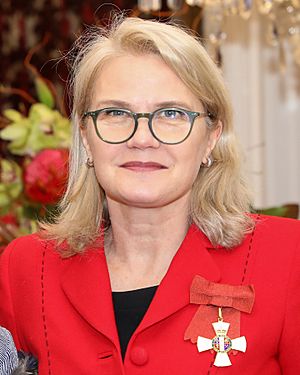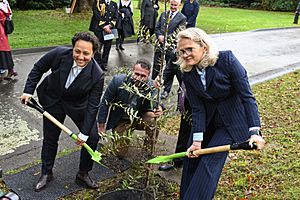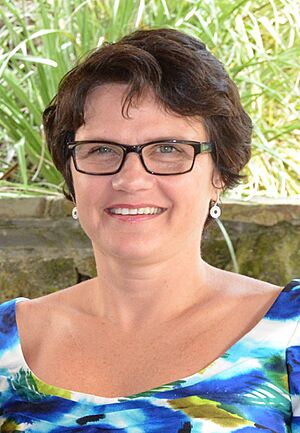Helen Winkelmann facts for kids
Quick facts for kids
Dame Helen Winkelmann
GNZM
|
|
|---|---|

Winkelmann in 2022
|
|
| 13th Chief Justice of New Zealand | |
| Assumed office 14 March 2019 |
|
| Nominated by | Jacinda Ardern |
| Appointed by | Patsy Reddy |
| Preceded by | Sian Elias |
| Personal details | |
| Born | 1962 (age 63–64) |
| Alma mater | University of Auckland |
| Profession | Barrister |
Dame Helen Diana Winkelmann (born in 1962) is the 13th and current Chief Justice of New Zealand. This means she is the most senior judge in New Zealand. She took on this important role on March 14, 2019. Dame Helen is the second woman ever to hold this position, following Sian Elias.
Contents
Early Life and Education
Helen Winkelmann was born in 1962. Her mother, Kathleen, had Croatian family roots. Her father was Douglas Winkelmann. Helen grew up in Blockhouse Bay, a suburb of Auckland, and went to Lynfield College.
After school, she studied history and law at the University of Auckland. She focused on business law. She earned two degrees: a Bachelor of Laws and a Bachelor of Arts in history. In 1985, she became a qualified lawyer.
Helen's sister is Adrienne Winkelmann, a well-known fashion designer in New Zealand.
Her Career as a Judge
Helen Winkelmann started her legal career at a law firm in Auckland. By 1988, at just 25 years old, she became a partner at the firm. This was a big achievement, as she was one of the youngest and the first female partner in the firm's long history.
In 2001, she started working as a lawyer on her own. She focused on cases involving business problems and other legal disputes.
High Court Judge
In July 2004, Helen Winkelmann was appointed a High Court judge. This is a very important role in New Zealand's justice system. She then became the Chief High Court Judge in February 2010. She held this position until 2015.
As Chief High Court Judge, Dame Helen made several changes to improve how the High Court worked. She wanted to make it easier for people to use the court system. She also worked to make sure cases were handled quickly. She helped the public understand the court's work better. For example, she started publishing annual reports for the High Court. She also helped set up a Twitter account for the Senior Courts to share information.
She often spoke about making sure everyone has fair access to justice. This means making sure people can get legal help when they need it.
Helping After Earthquakes
After the big 2011 Christchurch earthquake in 2011, Dame Helen helped set up a special "Earthquake List" in Christchurch. This list helped make sure legal cases related to the earthquake were dealt with quickly. This was very important for the community. For her work, she received an award in 2013 for excellence in judicial administration.
Dame Helen also worked with other senior judges to make court procedures better reflect New Zealand's two main cultures: Māori and Pākehā.
In June 2015, she joined the Court of Appeal. This court hears appeals from decisions made in lower courts. She also led the Institute of Judicial Studies (now Te Kura Kaiwhakawā). This institute provides ongoing training and education for judges.
Important Court Decisions
In a well-known case in 2012, Dame Helen made a ruling about search warrants. She decided that the warrants used to take property were too broad. This meant they were illegal because they allowed police to take things that were not related to the case. She also ruled that some actions taken with seized computer data were against the law.
Chief Justice of New Zealand
On December 17, 2018, it was announced that Dame Helen Winkelmann would become the next Chief Justice. She officially took on the role on March 14, 2019. As mentioned, she is the second woman to hold this very important position.
In 2019, before she became Chief Justice, she was given the title of Dame Grand Companion of the New Zealand Order of Merit. This is a very high honour in New Zealand.
Administrator of the Government

One of the Chief Justice's important duties is to act as the Administrator of the Government. This happens when the Governor-General of New Zealand is unable to do their job. This could be because the Governor-General is travelling overseas, is unwell, or if there is no Governor-General appointed yet.
Dame Helen Winkelmann has filled this role six times. She has stepped in when Governors-General Patsy Reddy and Cindy Kiro were out of the country. She also served as Administrator during the time between when one Governor-General left office and the next one started.
 | Leon Lynch |
 | Milton P. Webster |
 | Ferdinand Smith |


